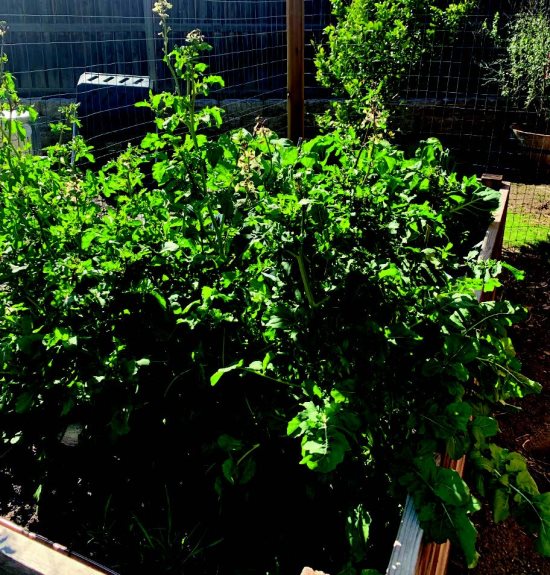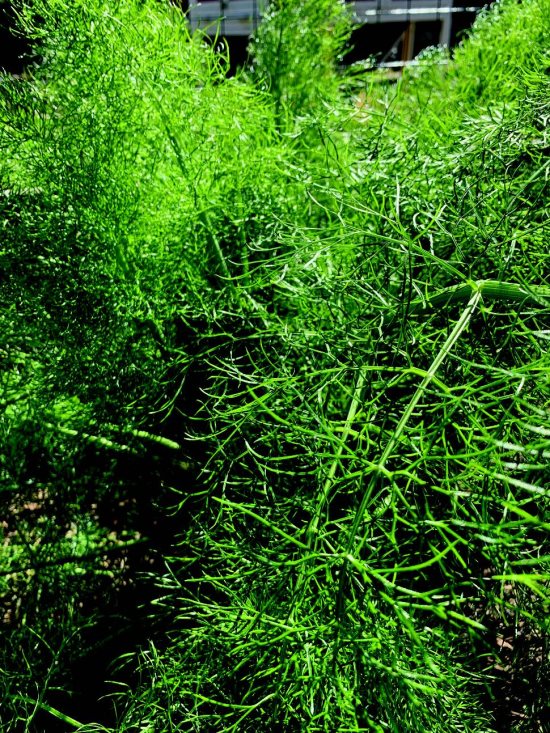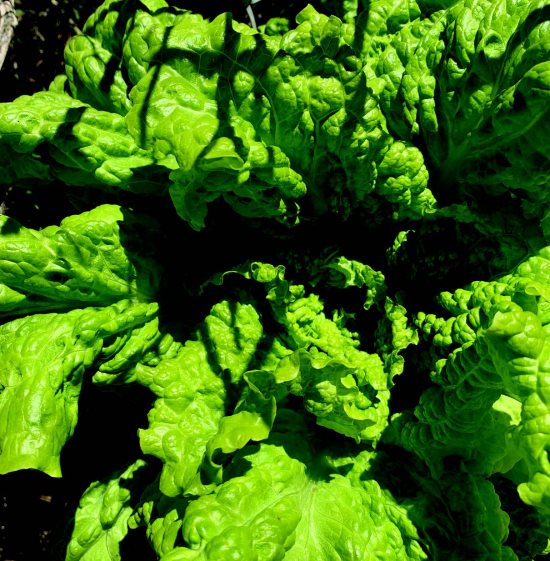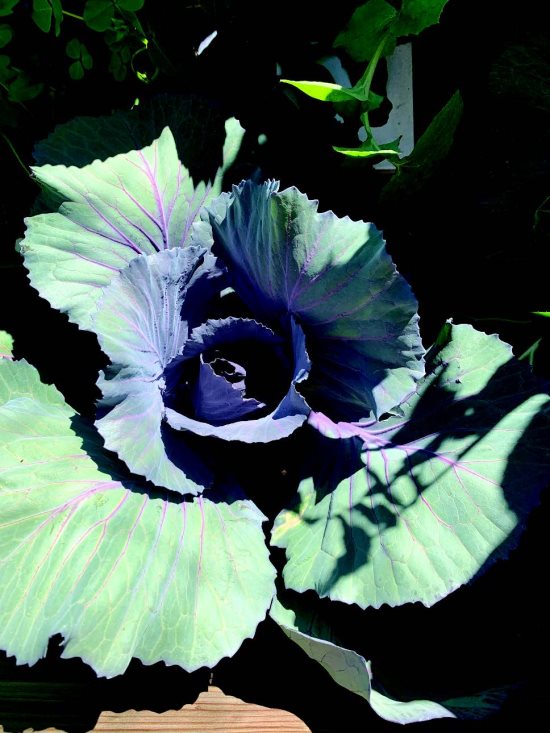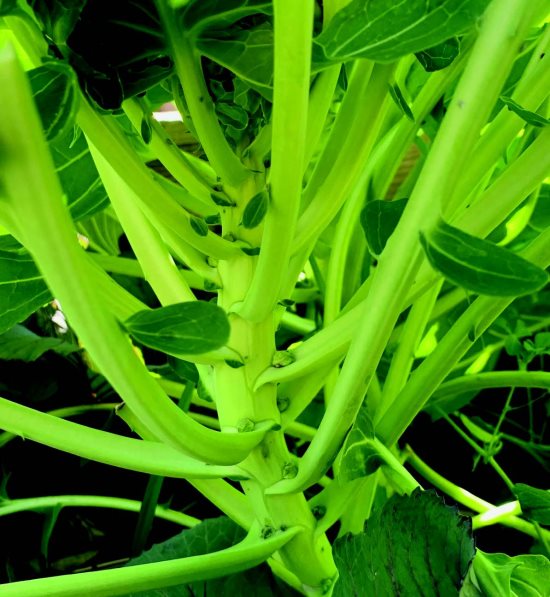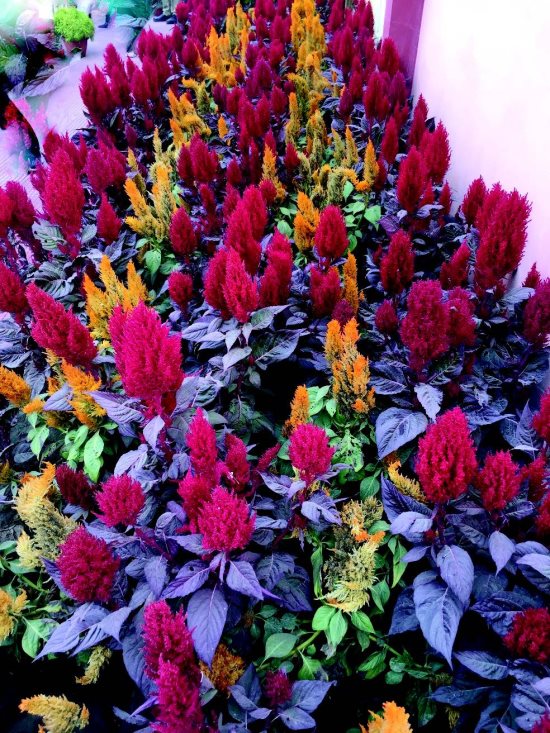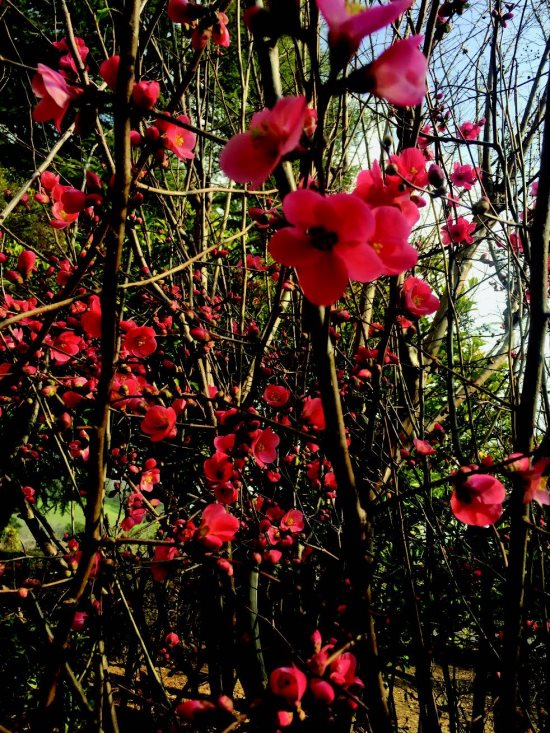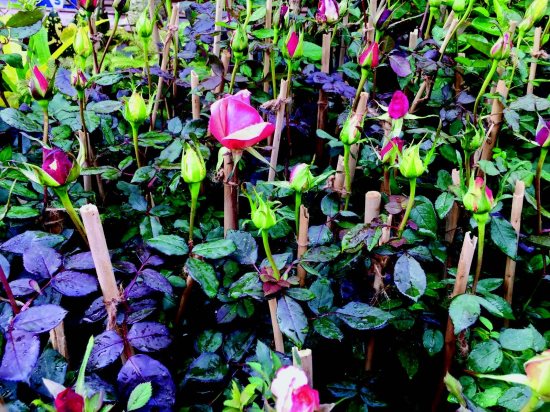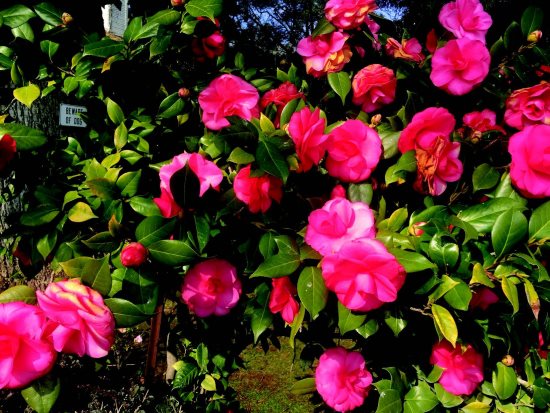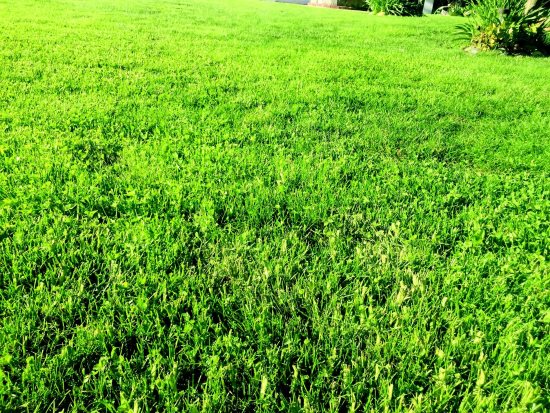 |
|
|
After the rains, lawns are lush, thick and emerald green. Photos Cynthia Brian
|
|
|
|
|
|
"In seed time learn, in harvest teach, in winter enjoy." - William Blake
 The thunder clapped. The lightning bolted. The skies opened.
The thunder clapped. The lightning bolted. The skies opened.
 Rain, life-giving rain.
Rain, life-giving rain.
 The garden rejoices.
The garden rejoices.
 The lawn, browned from the hot summer and autumn, is once again a lush verdant emerald. Fresh new leaves are beginning to unfurl on plants presumed expired. Weeds are sprouting in every crevice and worms are back working their tilling magic. Tiny pink buds are exploding on peach trees, white blossoms already cover the flowering pears, and scarlet blooms of Chinese flowering quince, a member of the rose family highlight the barren landscape. We are smack in the middle of winter with the opportunity to learn, teach and enjoy.
The lawn, browned from the hot summer and autumn, is once again a lush verdant emerald. Fresh new leaves are beginning to unfurl on plants presumed expired. Weeds are sprouting in every crevice and worms are back working their tilling magic. Tiny pink buds are exploding on peach trees, white blossoms already cover the flowering pears, and scarlet blooms of Chinese flowering quince, a member of the rose family highlight the barren landscape. We are smack in the middle of winter with the opportunity to learn, teach and enjoy.
 As you drive along the local roads, you'll witness fields carpeted in yellow. This is the wild mustard plant, the magical staple of my childhood. Every year in February and March our walnut orchards would be blanketed in 5-foot-tall plants that provided my siblings and me abundant opportunities to build forts, hide from our parents, and make mustard leaf sandwiches. We'd collect the seeds, mix them with vinegar and sea salt, and make our own culinary creations. Our dad would eventually till this beneficial cover crop back into the soil as a green manure to add nitrogen, increase drainage, and water retention.
As you drive along the local roads, you'll witness fields carpeted in yellow. This is the wild mustard plant, the magical staple of my childhood. Every year in February and March our walnut orchards would be blanketed in 5-foot-tall plants that provided my siblings and me abundant opportunities to build forts, hide from our parents, and make mustard leaf sandwiches. We'd collect the seeds, mix them with vinegar and sea salt, and make our own culinary creations. Our dad would eventually till this beneficial cover crop back into the soil as a green manure to add nitrogen, increase drainage, and water retention.
 If you planted seeds of edible greens and cool loving crops in the fall, you are now harvesting many members of the mustard family including cabbage, kale, collards, kohlrabi, broccoli, yellow mustard, bok choy and cauliflower. Buds of Brussels sprouts are forming their "sprouts" in the axils of leaves on the stalk. Flavor improves with Brussels sprouts after two or more frosty nights. The mustard family includes the genus Brassica whereby most of the leaves and flowers taste peppery. Since the flower pattern is in the form of a cross, the plants are referred to as cruciferous. Called superfoods, cruciferous vegetables pack a punch with disease-fighting phytochemicals, attributed to preventing cancers and cardiovascular diseases. Brassicas are also nutrient and fiber-rich with healthy plant omega-3s, vitamin A, C, E, B-1 and folic acid. They are easy to grow from seed in well-drained, fertile soil enriched with compost. Because Brassicas are prone to pests and soil-borne diseases, make sure to practice crop rotation and never compost the roots. Although you can use recycled containers to start seeds indoors in the winter, these plant varieties are more successful when seeds are sown directly in the garden.
If you planted seeds of edible greens and cool loving crops in the fall, you are now harvesting many members of the mustard family including cabbage, kale, collards, kohlrabi, broccoli, yellow mustard, bok choy and cauliflower. Buds of Brussels sprouts are forming their "sprouts" in the axils of leaves on the stalk. Flavor improves with Brussels sprouts after two or more frosty nights. The mustard family includes the genus Brassica whereby most of the leaves and flowers taste peppery. Since the flower pattern is in the form of a cross, the plants are referred to as cruciferous. Called superfoods, cruciferous vegetables pack a punch with disease-fighting phytochemicals, attributed to preventing cancers and cardiovascular diseases. Brassicas are also nutrient and fiber-rich with healthy plant omega-3s, vitamin A, C, E, B-1 and folic acid. They are easy to grow from seed in well-drained, fertile soil enriched with compost. Because Brassicas are prone to pests and soil-borne diseases, make sure to practice crop rotation and never compost the roots. Although you can use recycled containers to start seeds indoors in the winter, these plant varieties are more successful when seeds are sown directly in the garden.
 With the recent outbreaks of E. coli infections found in a variety of leafy greens and specifically romaine lettuce, growing your own vegetables is not only less expensive, but safer because you have the power to control what goes into your soil. Seeds of arugula, Swiss chard, lettuces, spinach, scallions, sorrel, fennel, and nasturtium can be succession scattered to ensure year-round eating pleasure.
With the recent outbreaks of E. coli infections found in a variety of leafy greens and specifically romaine lettuce, growing your own vegetables is not only less expensive, but safer because you have the power to control what goes into your soil. Seeds of arugula, Swiss chard, lettuces, spinach, scallions, sorrel, fennel, and nasturtium can be succession scattered to ensure year-round eating pleasure.
 Your vegetable garden has the potential to feed your family throughout all four seasons at a fraction of the cost of what you'd pay for equivalent produce at the market. In winter, you will rarely have to turn on a water source, and you can fertilize with your homemade compost. By saving the seeds of your favorite plants, you also won't have to buy new seed packets. During every planting period consider adding an unfamiliar crop that you've discovered by perusing seed catalogues.
Your vegetable garden has the potential to feed your family throughout all four seasons at a fraction of the cost of what you'd pay for equivalent produce at the market. In winter, you will rarely have to turn on a water source, and you can fertilize with your homemade compost. By saving the seeds of your favorite plants, you also won't have to buy new seed packets. During every planting period consider adding an unfamiliar crop that you've discovered by perusing seed catalogues.
 Even when the inclement weather is keeping you bundled up cozily seated by a blazing fire with a cup of hot lemon tea to ease your sore throat, if you've taken an hour or so to sow your favorite seeds, germination will be happening underground. One sunny day you'll walk outside to witness the miracle of nature. Voila! Instant leafy greens sown and grown in your personal heart-healthy home garden.
Even when the inclement weather is keeping you bundled up cozily seated by a blazing fire with a cup of hot lemon tea to ease your sore throat, if you've taken an hour or so to sow your favorite seeds, germination will be happening underground. One sunny day you'll walk outside to witness the miracle of nature. Voila! Instant leafy greens sown and grown in your personal heart-healthy home garden.
 Pass the mustard!
Pass the mustard!
 Cynthia Brian's Mid-month Gardening Guide for February
Cynthia Brian's Mid-month Gardening Guide for February


 PICK UP the fallen blooms of camellias to prevent the fungus Camellia blossom rot which causes blooms to turn brown from the center out. Do not compost spent blossoms. Put the dead blooms in the trash bin.
PICK UP the fallen blooms of camellias to prevent the fungus Camellia blossom rot which causes blooms to turn brown from the center out. Do not compost spent blossoms. Put the dead blooms in the trash bin.
 USE Chinese flowering quince as a spiny hedge or barrier.
USE Chinese flowering quince as a spiny hedge or barrier.
 DON'T mow or walk on your lawn after a rain when the soil is too moist or you will damage the grass and cause rivets in the soil.
DON'T mow or walk on your lawn after a rain when the soil is too moist or you will damage the grass and cause rivets in the soil.
 PLANT seedlings of celosia next month for a late spring show.
PLANT seedlings of celosia next month for a late spring show.
 FINAL time to heavy prune your roses. Dip canes in a rooting solution and plant in rich soil in small containers to give as summer hostess gifts.
FINAL time to heavy prune your roses. Dip canes in a rooting solution and plant in rich soil in small containers to give as summer hostess gifts.
 GROW your own Brassicas and leafy greens by sowing seeds in succession.
GROW your own Brassicas and leafy greens by sowing seeds in succession.
 MAKE homemade mustard from the seeds of wild mustard by grinding them and adding salt, spices and vinegar.
MAKE homemade mustard from the seeds of wild mustard by grinding them and adding salt, spices and vinegar.
 PRUNE and shape pelargoniums and geraniums for fuller flowering.
PRUNE and shape pelargoniums and geraniums for fuller flowering.
 WASH leaves of indoor plants that are dusty. Re-pot if necessary.
WASH leaves of indoor plants that are dusty. Re-pot if necessary.
 FEED the birds as winter is challenging for them to find essential food sources.
FEED the birds as winter is challenging for them to find essential food sources.
 Happy Gardening. Happy Growing.
Happy Gardening. Happy Growing.
|
Cynthia Brian in a field of mustard.
Cynthia Brian, The Goddess Gardener, raised in the vineyards of Napa County,
is a New York Times best-selling author, actor, radio personality, speaker,
media and writing coach as well as the Founder and Executive Director of Be
the Star You Are1r 501 c3.
Tune into Cynthia's Radio show and order her books at
www.StarStyleRadio.com.
Buy a copy of her new books, Growing with the Goddess Gardener and Be the
Star You Are! Millennials to Boomers at www.cynthiabrian.com/online-store.
Hire Cynthia for projects, consults, and lectures.
Cynthia@GoddessGardener.com
www.GoddessGardener.com
Donate to Fire Disaster Relief via Be the Star You Are!r 501 c3 at
www.BethestarYouAre.org |

